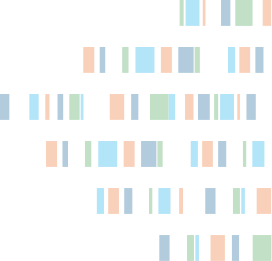We’re looking forward to connecting with you in Atlanta, GA, June 13-17th
Meet the experts
Catch our team of experts in booth 726 to learn more about how we can work together to help drive your microbial research forward.
Spotlight session
Saturday, June 15th, at 4:15 pm, in Lounge & Learn 3
myBaits® Mission: Unveiling Pathogens and Antimicrobial Resistant Genes for Microbial Surveillance
Highly complex samples present challenges when the DNA or RNA targets of interest are low abundant, degraded, or both; even very deep sequencing may not effectively resolve the sequences of interest due to the high levels of exogenous content. In such cases, myBaits® hybridization capture probes from Daicel Arbor Biosciences can be used to enrich a specific subset of the community, whether it is virus, protozoan, bacterial, or genes associated with antibiotic resistance. Enrichment is just one additional step in most NGS library preparation and analysis pipelines, allowing quick and easy adaptation and integration into currently used methods. Additionally, the flexibility of the probes to allow mismatches with target sequences facilitates retrieval of unknown variants, even from highly degraded DNA.
In this session, our scientists will highlight features of this powerful platform in conjunction with enriching AMR genes and various pathogens from complex samples.
Megan Beaudry, Ph.D.

Megan joined Daicel Arbor Biosciences in 2023 as a Genomics Technical Specialist. With a strong background in genomics and a passion for advancing scientific research, Megan plays a key role in developing and implementing cutting-edge genomics technologies. Prior to her work at Daicel Arbor, Megan completed her doctoral research at The University of Georgia, focusing on clinical microbiology developing NGS and bioinformatic pipeline tools to solve microbial public health problems.
Brian Brunelle, Ph.D.

Brian joined Daicel Arbor Biosciences in 2019 as a Lead Product Scientist for our Targeted Sequencing Solutions team, and was promoted to Senior Product Manager in 2023. With a wealth of experience in product management and a foundation in genomics, Brian plays a pivotal role in driving the development and commercialization of genomics products to advance scientific solutions for researchers. Prior to joining the Daicel Arbor team, Brian completed their doctoral research at the University of California, Berkeley, and has over nine years of microscopic research experience.
Coming soon: myBaits expert respiratory virus panels
Targeted whole genome sequencing of respiratory viral pathogens
Simplify your respiratory viral genome sequencing with our modular targeted NGS panels. These easy-to-use NGS kits are designed to target genomes of pathogenic respiratory viruses, for use by virologists, epidemiologists, evolutionary biologists, and public health researchers.
Choose from our “complete” pre-mixed solution that includes all available viral modules, or build your own combination from our standalone panels that target individual viral groups.
- 21 bait sets for common human respiratory viruses, used individually or combined
- Confirm existing variants or discover new genome variation
- Easily detect and strain-type viruses in a single assay
- Characterize tens to thousands of samples on a single sequencing run
- Save orders of magnitude in sequencing costs of heavily host-contaminated samples
- Compatible with degraded R/DNA e.g., wastewater, environmental samples, FFPE
Visit us at booth #726
Stop by to chat about:
- Achieving the full benefits of targeted microbial sequencing with solutions for hybridization capture
- Our comprehensive publications database and how Daicel Arbor Biosciences has supported thousands of research programs around the world
- Anything else on your mind!
Resources
Microbial sequencing
- Application note: Targeted Genomics for Pathogen and Microbial Communities
- Application note: Targeting the “Resistome”: Sequencing Antimicrobial Resistance Genes with myBaits DNA-Seq Capture
Long-read sequencing
- Educational video: Introduction to myBaits hybridization capture


 Bluesky
Bluesky